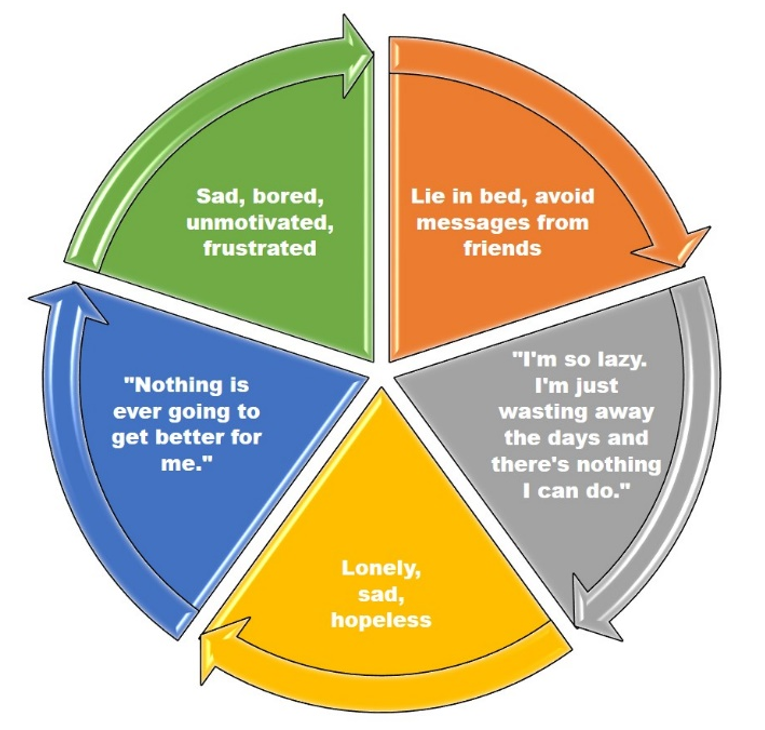How to help youth tackle the blues during COVID-19 and #physicaldistancing
Posted on March 31, 2020 by the Canadian Paediatric Society | Permalink
Topic(s): Public education, COVID-19
By Erin Romanchych and Dr. Daphne Korczak
Social or physical “distancing”– a new term that has become a common household phrase– can make youth feel confused, scared, frustrated, worried, guilty, sad, and lonely. Youth are being asked to change their routines: They can’t go to school or work, see friends at parties or social events, or participate in extracurricular activities.
For youth who were already feeling sad, depressed, or lonely, having to distance themselves from others (or for some, to self-isolate), can make the symptoms of depression—like feeling irritable or hopeless—even worse.
Youth may find themselves in vicious cycles that reinforce negative mood:

With the restrictions around activities that previously might have helped them feel better—such as leaving home to go to school, social gatherings, and extracurriculars—youth may find themselves stuck in these negative cycles and needing some support to find their way out.
Here are some suggestions for parents to support youth:
- Validate feelings. Naming and validating feelings can help youth to remember that it’s okay for them to experience unpleasant feelings. It may also open up a discussion about ways to cope with their feelings. “It’s okay to feel sad and frustrated right now.”
- Create a new routine. When youth become stuck in these vicious cycles, it can sometimes feel impossible to get back into activities they used to enjoy. Yet one of the most helpful strategies to improve mood is to do something. Encourage them to start with something small, such as watching a funny show or going for a short walk, and then gradually increase activities. For example, playing a game, baking, drawing, doing a puzzle, reading an interesting book, or going for a bike ride. Being active can lead to positive feelings and moods, and in turn, can increase feelings of hope. With the changes in routines due to COVID-19, try creating a schedule that includes doing an enjoyable activity (or something they used to enjoy doing), daily tasks, appropriate sleep, healthy eating, and moderate exercise, such as going for a walk or riding a bike.
- Challenge negative thoughts. Recognizing negative thoughts and replacing them with more helpful and realistic thinking can help to improve mood and increase motivation to do something. For example, “This is never going to get better for me,” can be changed to, “These feelings are temporary and will get better. I can try calling one of my friends or going for a walk.” Ask your child, “What might be a more helpful way to think about the situation?”
- Solve any immediate and controllable problems. Solving problems can often make us feel productive and improve our mood. Sometimes, youth feel that there is no way to solve a problem. Remind them that the goal is to find a “good enough” solution, not necessarily a perfect one. Help your child to think of all possible options for solving a problem, consider pros and cons, choose the best option, and try it out. If the problem can’t be solved in the moment, try using distraction by doing an activity, helping someone, thinking about something else, or using relaxation and mindfulness.
- Stay connected to family and friends. The term “physical distancing” reflects the importance of being social while staying safe. We can do this by using virtual platforms to hang out, celebrating birthdays with group video chats, or writing letters to family members. Sometimes it takes a little creativity and willingness to try something new, but finding new ways to socially connect is more important than ever!
- Be kind. Hours can turn into days, and days into weeks, and youth may start to blame themselves or become overly self-critical for not “doing enough”. Encourage your child to focus on being “good enough”, celebrate achievements no matter how small they may seem (like, making their bed or baking something), and to treat themselves with kindness. For example, saying, “I am feeling really down. Lots of people feel this way right now and I am doing the best I can to cope with it.”
- Reach out to a professional if low mood is having a serious impact on mental health. It’s okay to seek help. Many psychologists and therapists are offering virtual therapy sessions to help support youth through this stressful time. Kids Help Phone (kidshelpphone.ca/) has lots of resources.
Take it one day at a time and look for hope in the small things. These feelings and changes in everyday life are temporary. Remember, “this too shall pass”.
Erin Romanchych is a clinical psychologist in the Department of Psychiatry at SickKids. Dr. Daphne Korczak is Director of the Children's Integrated Mood and Body (CLIMB) Depression Program at Sick Kids, and Chair of the Canadian Paediatric Society’s Mental Health Task Force.
Copyright
The Canadian Paediatric Society holds copyright on all information we publish on this blog. For complete details, read our Copyright Policy.
Disclaimer
The information on this blog should not be used as a substitute for medical care and advice. The views of blog writers do not necessarily represent the views of the Canadian Paediatric Society.
Last updated: Apr 20, 2020

